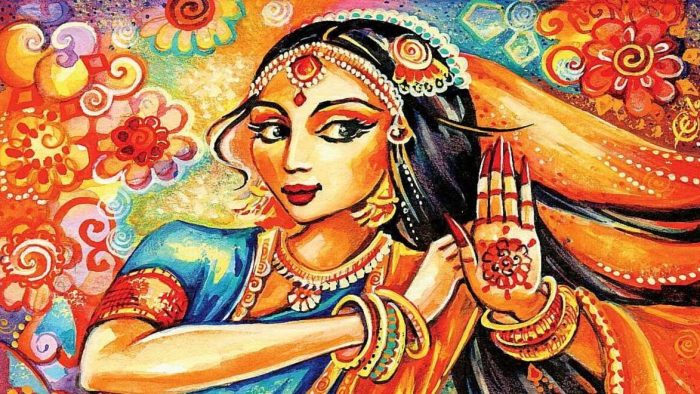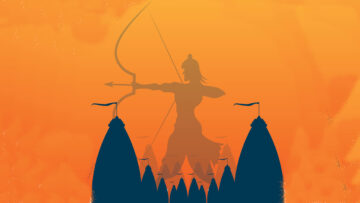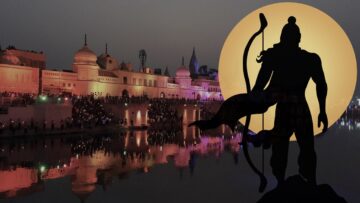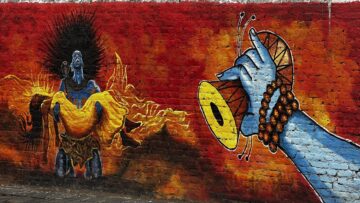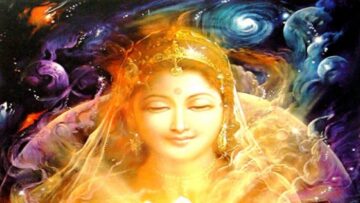The Hindu epic Mahabharata has the mention of Queen Gandhari and her hundred sons. The Mahabharata is much read and recognized with Pandavas popular as Panch (Five) Pandavas and Shatam (Hundred) Kauravas. The brothers fought the battle of Kurkshetra in which all the hundred sons of Gandhari were martyred and the Pancha Pandavas lived to rule the kingdom of Hastinapur . The mythological epic Ramayana has a mention of Apsara Ghṛtācī or Ghritachi and her hundred beautiful daughters.
Apsara Ghritichi was a beautiful nymph and has her mention in both the Ramayana and the Mahabharata. Apsara Ghritachi was a gorgeous damsel with black curly hair and red lips who plays an important role in the Kusha lineage.
The Curse
In the Ramayana -Bala Kand , Rishi Vishwamitra narrates the story of Kusha and his four sons to Shri Ram while camping on the banks of River Magadhi. Maharishi Vishwamitra introduces Shri Ram to his Kusha lineage . King Kusha was a Chandravamsha ruler who had four sons – Kushambha, Kushanabha, Asurtarajasa and Vasu. All the four sons ruled independent kingdoms. Kushanabha built a city called Mahodaya.
Kushanabha was enchanted by the beauty of a gorgeous celestial maiden , Apsara Ghṛitachi. King Kushanabha fell in love with Apsara Ghṛitachi and married her. Out of the matrimony Apsara Ghṛitachi gave birth to hundred eye-catching daughters.
कुशनाभस्तु राजर्षि: कन्याशतमनुत्तमम्।
जनयामास धर्मात्मा घृताच्यां रघुनन्दन।। १-३२-११।।
Kushanabhastu Rajarshi: Kanyashtamanuttamam.
Janmayas Dharmatha Ghritaichya Raghunandan. 1 – 32 – 11
– Valmiki Ramayana, Bala Kanda
Meaning – Oh! The successor of the Raghu family, the virtuous rajarshi Kusanabha begot one hundred beautiful daughters through a nymph named Ghritachi.
The hundred daughters of Apsara Ghṛitachi and King Kushanabha were endowed with immense beauty and multiple talents. One day as the hundred daughters of Apsara Ghṛitachi were singing, dancing, and playing musical instruments in the palace garden, Vayu- The Wind /air God saw them. Vayu Deva was so fascinated upon seeing them, he proposed marriage to them. He offered to eternalize their beauty if they agreed to marry him. Lord Vayu said
चलं हि यौवनं नित्यं मानुषेषु विशेषतः |
अक्षय्यं यौवनं प्राप्ता अमर्यश्च भविष्य्थ || १-३२-१७
Calaṁ hi yauvanaṁ nityaṁ mānuṣēṣu viśēṣataḥ |
akṣayyaṁ yauvanaṁ prāptā amaryaśca bhaviṣytha || 1-32-17
– Valmiki Ramayana, Bala Kanda
Meaning – Oh beautiful damsels! Teenage is always transitory, expressly in humans, but by marrying me you will achieve undiminished youthfulness and forever you can be youthful like immortal females.’ Thus Air-god said to those girls.
The hundred girls laughed at Vayu Deva for his proposal as they felt dishonoured. The obedient hundred daughters of King Kushanabha refused Lord Vayu’s proposal by saying that they would require the permission and consent of their father to marry him. They said
मा भूत्सकालो दुर्मेधः पितरं सत्यवादिनम् |
अवमन्य स्वधर्मेण स्वयंवरमुपास्महे || १-३२-२१
Mā bhūtsakālō durmēdhaḥ pitaraṁ satyavādinam |
avaman’ya svadharmēṇa svayanvaramupāsmahē || 1-32-21
– Valmiki Ramayana, Bala Kanda
Meaning – That time shall never come. Oh! God with distasteful thoughts, when we, at our liberty, may look up for our grooms overlooking our veracious father.
Vayu was not expecting such an evasive response. Vayu was furious to get a negative consent to his proposal. In a rage he entered all the hundred girls, he disfigured them leaving them ugly and undesirable. Vayu turned all of them into hunchbacks.
तासां तु वचनं श्रुत्वा हरिः परमकोपनः |
प्रविश्य सर्वगात्राणि बभंज भगवान् प्रभुः || १-३२-२३
Tāsāṁ tu vacanaṁ śrutvā hariḥ paramakōpanaḥ |
praviśya sarvagātrāṇi babhan̄ja bhagavān prabhuḥ || 1-32-23
– Valmiki Ramayana, Bala Kanda
Meaning – Hearing their sentence of rejection, Vayu, the Air-God whose impact is powerful, very angrily entered into all of the limbs of those girls only to disfigure them.
With tearful eyes and remorse, the girls narrated the entire incident of the curse to their father. King Kushanabha became sad to see his deformed daughters but praised the daughters for being responsible and dutiful. From that day the city of Mahodaya came to be known as कन्या- कबुज , Kanyā-Kubja – The city of the hunchbacked maidens.
Freedom from Vayu’s Curse
Rishi Vishwamitra continued the story of how the beauty of the hundred girls was restored. He furthers the narrative by introducing Brahmarishi Chuli who was looked after by a beautiful Apsara named Somada.
तपस्यताम् रिषिम् तत्र गन्धर्वैयि पर्युपासते ।
सोमडा नाम भद्रं ते उरुमिला तनया तदा ॥ १-३३-१२
Tapasya.Ṭām riṣim tatra gandharvaiyi paryupāsatē |
sōmaḍā nāma bhadraṁ tē urumilā tanayā tadā || 1-33-12
– Valmiki Ramayana, Bala Kanda
Meaning – While that sage is in the practice of asceticism a celestial female served him at the place of his asceticism, safety be with you oh, Rama, she is Somada, the daughter of Urmila.
Apsara Somada dedicatedly served Chuli without creating hindrances in his penance. Rishi Chuli was pleased with her service and wanted to fulfill a wish she desired. Apsara Somada shared her desire to bear a son of the great Rishi Chuli. Since she was unmarried, she requested Rishi Chuli to grant her a son through his powers.
अपतिह् च अस्मि भद्रम् ते भार्या च अस्मि न कस्यचित् ।
ब्राह्मेन उपगतायाह् च दातुम् अर्हसि मे सुतम् ॥ १-३३-१७
apatih ca asmi bhadram te bhaaryaa ca asmi na kasyacit |
braahmena upagataayaah ca daatum arhasi me sutam || 1-33-17
– Valmiki Ramayana, Bala Kanda
Meaning – Somada says to Rishi Chuli, “I am unmarried and nobody’s wife, safe you be, and as I took shelter under your kindness it will be apt of you to endow me a son with your faculty of asceticism.’
Brahmarishi Chuli blessed Apsara Somada with a great son with Brahma like aura. Apsara Somada’s son came to be known as Brahmadatta, the ruler of Kampilya.
King Kushanabha decided to offer his hundred daughters in marriage with King Brahmadatta. Brahmadatta accepted King Kushanabha proposal and agreed to marry his hundred disfigured daughters. During the marriage rituals, as king Brahmadatta took the palm of each of his daughters into his hands, they were corrected of their blemish and retained their former beauty.
स्पृष्टमात्रे तत: पाणौ विकुब्जा विगतज्वरा:।
युक्ता: परमया लक्ष्म्या बभु: कन्याशतं तदा।।१.३३.२३॥३२।।
sprista maatre tatah paanau vikub hjaa vigata jvaraah |
yuktaah paramayaa laksmyaa babhau kanyaa shatam tadaa ||
– Valmiki Ramayana, Bala Kanda 1.33.23।।32
Meaning – Thereafter, with the mere touch of his hand, a hundred daughters were cured of their humpback and freed from anguish. They assumed great beauty.
King Kushanabha, saw all his daughters released from the curse of Vayu and was very happy. With immense faith in Brahamadatta, king Kushanabha and Apsara Ghṛitachi performed the marriage rituals of their hundred daughters and sent them as wives of Brahmadatta to Kampilya. On reaching Kampilya, King Brahmadatta’s Apsara mother Somada was overjoyed with the deed of her son Brahmadatta.
She was overwhelmed by the feeling that her son was able to free a hundred princesses of the blemish caused by Vayu Deva. She was very happy to accept all the hundred princesses as her daughters-in-law. With the ending of Vayu Dev’s curse, the hundred daughters of Apsara Ghṛitachi settled into happy matrimony.
After the departure of his hundred daughters, King Kushanabha desired for a son and started the Putrakameshti Vedic ritual, in order to beget a son. His wish was fulfilled and soon he was blessed by a virtuous son named Gaadhi. King Gaadhi became the father of Maharshi Vishwamitra.
Explore Apsaras series Part I, II, III, IV, V, VI, VII, and VIII
Disclaimer: The opinions expressed in this article belong to the author. Indic Today is neither responsible nor liable for the accuracy, completeness, suitability, or validity of any information in the article.

